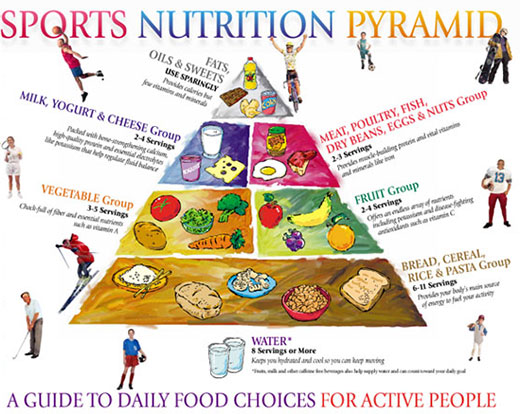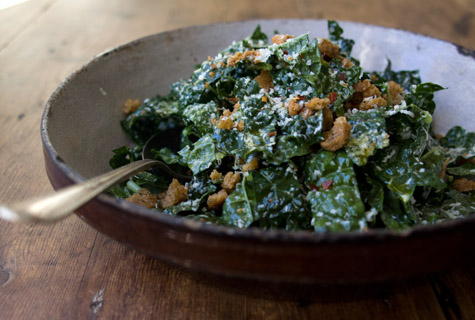I noticed that the more serious and dedicated goalkeepers in attendance - also the more talented ones - asked questions and took notes. Others treated the classroom session with barely concealed impatience. Among them, the common refrain was, "I know I should eat better, but does it really matter? I'm young."
Yes. Young or old, it matters.
Granted, you can get away with a lot more dietary indiscretions when you're young. But that doesn't mean you won't still pay a price for a poor diet. I have always maintained that goalkeepers' energy needs for a match are just as critical as outfield players, despite the fact that we obviously do far less running. In our case, we have to concentrate a great deal more, and concentration is impossible without energy. When I was playing ten p.m. games in New York in recent years, I sometimes found myself hungry in the second half. That's not good. In addition to the loss of energy and explosiveness that comes with low blood sugar, it's never good for your concentration to be thinking about food as the game rages around you. To solve this problem, I adjusted my schedule, ate a later dinner, often had a banana or bagel right before kickoff, and supplemented this with energy gels or chews at halftime. It did not guarantee better performances, but since there are many things out of our control in goalkeeping, it only makes sense to take care of things that we can control.
These days, as a fulltime coach, my energy levels are even more critical. My goalkeepers and players depend on me to be engaged, dynamic, and active in my coaching. In some goalkeeper sessions, I might serve hundreds of balls, demonstrate a new or complex drill, or act as an attacking player in a match-related training activity. I'm on my feet for hours at a time, in sweltering summer heat and humidity or bone-cracking winter cold. This takes good fuel, especially at my age.
Not really a performance food
Until last year, my diet was pretty poor. I was lean and in good shape because I don't have a huge appetite and I love the gym, but I was putting junk into my body every day, in the form of sodas, fried foods, and processed, sugary treats. I've always had a sweet tooth, and assumed it would be brutally hard to change my diet, but it really wasn't. Once I finally made the decision - more about that it a moment - it was simply a matter of replacing bad things with healthy things I liked. Luckily, it turned out I like spinach and kale, so I began replacing my pizza and burger lunches with grilled chicken salads. I switched from sodas to green tea sweetened with honey - still a little sugary, but exponentially better than soda - and replaced my late-night ice cream snacks with a Kashi Organic Cinnamon cereal. My pre-training, quick energy snack is an organic peanut butter, banana, and honey sandwich, and I have a chocolate milk right after, for recovery.
I made the decision to change my diet because, for the first time in my life, I noticed a slight increase in body fat. That is to say, I actually had body fat for the first time in my life. There wasn't much, but I didn't like it, and knew it indicated that my metabolism was, at long last, slowing down.
I also have to think beyond athletics and toward the issue of general health. Even the best diet is no guarantee against cancer, heart disease, or other serious illnesses and conditions, but it's the single best thing you can do to tilt the odds in your favor. This, again, is something young athletes likely don't concern themselves with, and I understand that. But I have noticed several things that have definitely helped my athletic performance, and would apply to an athlete of any age.
You'll learn to love it - or at least tolerate it
The first is that I sleep much better since cutting out caffeine. I've gone from three or four sodas a day to, at most, one per week. I no longer bolt awake in the middle of the night, jittery and nervous, as I did regularly for years. Better, more restful sleep means I'm rising more refreshed and energetic, and also earlier. Not long ago, I needed at least eight hours of sleep, and would often go as long as ten. Now, seven feels just right.
I also have more energy now. This is not surprising, since I used to fill up on foods high in fat and simple sugars, both of which increase inflammation and interfere with the various processes involved in turning food into readily available energy. Related to both more energy and better sleep, I no longer feel like I need an afternoon nap. Even when my schedule allows for it, I rarely bother with what was once a necessity.
Finally, I no longer feel like a hypocrite. For years, I have preached the value of good nutrition to my players, then gone home and inhaled a pint of Ben & Jerry's. I always justified it by pointing to my general fitness levels and gym work, but I knew it was a poor excuse. A coach has a responsibility to set the example for his players. You either embrace that responsibility or shirk it. It feels good to finally be on the right side.
I stress that I am not a nutrition expert, and nobody should take specific instruction from me about what to eat. I simply have had the benefit of working with professional nutritionists and sports performance coaches. There are hundreds of great, reputable sources online, for anyone needing a little guidance. I will say only this: if you know you need to make a change, but think it will be too hard, just try it for one day. You'll be surprised how fast your taste buds adapt to a new diet. I get the same satisfaction from my grilled chicken salads now as I did from the double cheeseburger tray from CookOut a few months ago. And most experts agree that you should build 'cheat days' into your week, so you don't feel like you're punishing yourself.
If any of you have your own stories, recipes, or favorite foods, I'd love to hear about it in the comments, or on twitter. Thanks for reading!





0 comments:
Post a Comment